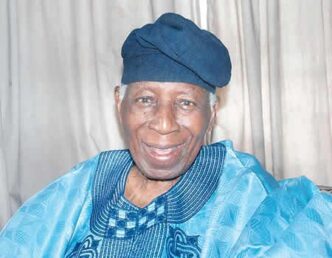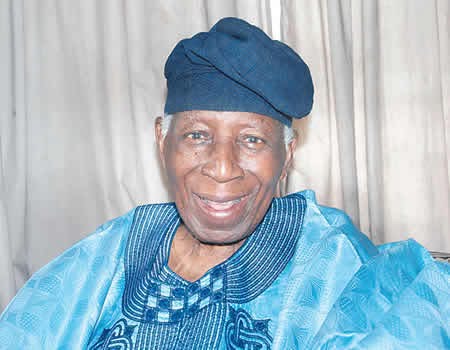Natasha Akpoti-Uduaghan
Sorry, I digress. Gradually, the Nigerian presidency is putting finishing touches to its own sculpture of a village liar, Ìbídùn, it is busy carving. Or writing itself into the pathetic biblical story of an early Christian community in Jerusalem which witnessed a lying couple by the name, Ananias and Sapphira. Ìbídùn was the proverbial woman who, determined to make deception an art, walked close to a popular masquerader at the marketplace. Amidst the din of wild dances and celebration, Ìbídùn saluted the masquerader thus: “it has been quite a while!” In a masquerade cult shrouded in secrecy, where identity of the masquerader is hidden from everyone, male or female, except initiates, how did Ìbídùn know the personality shrouded under the agò (costume)? To capture Ìbídùn’s costly deception, my people say, “Èké Ìbídùn tií kí eégún kú àtijọ́”.
While the president junkets, off-the-cuff, to Paris like a chronic diabetic flying into the restroom, his Tańtólóhun dogs (Ref my piece, Obasanjo and Tinubu’s Tańtólóhun dogs, November 24, 2024) spin an embarrassingly deceptive refrain that he goes “on a working visit.” As this deception roulette is fast taking the toga of Ìbídùn’s lie, I have a cryptic projection for this uncritical lie: When the going goes, the come will end up coming. It is a literal lift from the Yoruba warning, “bí àlọ bá lọ, àbò nbọ wá bọ”. It warns of impending repercussions for the Ìbídùns. At a time when their home is burning, with more than 52 people reported dead in the recent Plateau State crisis, the president and his vice are trapped in the comfort of foreign lands.
I am back. Whether sponsored, contrived, deliberate or real, the discourses surrounding Natasha Akpoti-Uduaghan since that space-induced altercation in the parliament broke out, would make you think you were in pre-colonial Nigeria. And Natasha Akpoti-Uduaghan, an incarnate of infamous 1930 sexual mascot, Segilola. Saheed Aderinto’s 2015 book, When sex threatened the state: Illicit sexuality, nationalism, and politics in colonial Nigeria (1900-1958), did justice to Segilola. According to him, one of the most detailed sexual narratives of that time could be found in the sexual memoir of Segilola, a Lagos prostitute. Written in Yoruba, its title was, Ìtàn Ìgbésí Aiyé Èmi Segilola El’ẹyinju Ẹgẹ, Elegberun Ọkọ L’aiyé.
When translated into English, the book title reads, “The Life History of Me Segilola Endowed With Fascinating Eyes, the Sweetheart of a Thousand And One Men”. Advertised in the July 5, 1930 edition of the bi-lingual newspaper, Akéde Èkó (The Lagos Herald), the book, which British anthropologist, Karin Barber, called the first Yoruba novel, sold out during the period of its 30-chapter serialization in the newspaper. It became such a literary hot cake to gobble that it caused peer jealousy and rivalry between The Lagos Herald and the dominant newspaper of the time, The Nigerian Daily Times.
Advertisement
Born in September 1882, Segilola was a lady of noble parentage, the sole survivor of her parents’ six children, who chose to commercialize her body for men’s sensual feast. From the time she lost her virginity to a herbalist whom she ran to for procurement of sex charm, Segilola courted men across generations. One of her lovers promised her pocket money of 10 pounds and another, between 1910s and 1920s, spent 30 pounds on her in three months. Knowingly or unknowingly, the adversaries of Akpoti-Uduaghan have attempted to cast her in the mould of Segilola. Her traducers sexualise her travails, belittle her courage and audacity, as well as her resistance to male chauvinism and the tyranny of her tormentors.
Akpoti-Uduaghan, like Segilola, is however an El’ẹyinju Ẹgẹ, in possession of a ravishing beauty. Her travails began as politics of space allocation on the floor of the Nigerian senate. Gradually, it transformed into sexual politics, reminding one of French historian, Michel Foucault’s discourse on sexuality. Foucault had submitted that there is a link between sex and relations of power. Today, the spat between this senator representing Kogi Central and president of the senate, Godswill Akpabio, has effectively polarised Nigerians along divides: gender, politics, etc.
Akpoti-Uduaghan is a prostitute. She appears on the floor of the Senate in transparent dresses. Senate is not a clubhouse. She has had four husbands and four children, so go the narratives. Even a newspaper, daily used as validation of federal power, did what it called an expose on the senator. With the title, “The Natasha we knew”, it lent assistance to Natasha’s adversaries in ill-sexualising her, and positioning her as Segilola incarnate. This it did by excavating what it called her sexual past. The aim was to profile Natasha as a woman who has seen more men’s nakedness than an Ijaw fisherman can ever see shrimps. Or, as Cleopatra (70-30BC), Queen of the Ptolemaic Kingdom of Egypt. Cleopatra deployed her charm and bewitching beauty to seduce Julius Caesar and Mark Anthony, succeeded in having children for both.
Advertisement
On the social media, Akpoti-Uduaghan has further been profiled as possessing a feral ferociousness. Even Senator Adeseye Ogunlewe attempted to add a salacious dimension to the mix: “But the beauty of Distinguished Senator Natasha is a problem to her… there’s no doubt about that… when she’s passing, there’s no way a man will not look at that woman”, he said on a national television interview.
Contrariwise, Natasha is better suited for casting in the mould of Mekatilili wa Menza. Mekatilili was Kenya’s 19th century amazon, a precursor of Dedan Kimathi’s Mau Mau uprising heroism against British colonial imperialism. Mekatilili, like Natasha, suffered tar-brushes and profiling of the male gender and from even women of similar biology. As her Giriama people resisted British tyranny, Mekatilili was profiled as one of those who forced her people into blood oath administration, especially at the rituals held in July and August, 1913 at Kaya Fungo. History however today recorded Mekatilili as a feminist symbol of resistance, a strong woman from a marginalized ethnicity who challenged oppressive norms of a male-dominated society. In the Giriama resistance to colonial policies which led to the uprising of 1913, Mekatilili played a significant role.
The crossroads where Mekatilili and Akpoti-Uduaghan’s path would seem to have met actually happened at a public baraza (meeting) in Kenya. Mekatilili confronted Arthur Champion, British colonial administrator, swearing never to allow him enlist Giriama youth to work in plantations. Deploying an anecdote to depict the battle ahead, Mekatilili dared Champion to take away the chick from Mother Hen and see Mother Hen’s ferocious resistance.
Since the last one month or so when the initial spatial politics on the floor of the Nigerian senate began, Akpoti-Uduaghan has shown her traducers that they had taken away the chick from Mother Hen. You may not know the orthodoxies that she has thus far challenged, the battles she has resisted, and the graphs she has redrawn regarding the sociopolitics of Nigeria. The first graph she re-plotted is one which hitherto assumed that, every beautiful woman is a Segilola prostitute, a chattel and sex symbol. With the multiple battles Natasha has fought in the last one month; the strings – national and international – she has pulled and the upturn of the narratives she has made by internationalizing her battles, Natasha has shown that she possesses more brain than scores of her male colleagues who mark time in the Nigerian parliament. More instructively, she must have shown her constituents who thought her femininity was a drawback that she is a battleaxe stronger than many men.
Advertisement
In their book, How Democracies Die (2018), two Harvard University professors of government, Steven Levitsky and Daniel Ziblatt, outlined how we wrongly assumed that democracies die in the hands of men with guns. Democracies, they posited, “erode slowly, in barely visible steps”. It gets broken in a less dramatic but equally destructive way in the hands of leaders who subvert the process, by so doing dismantling it quickly. Hitler did same with the Reichstag fire. This was a false flag arson attack on the German parliament which became pivotal in the establishment of Nazi Germany. “Many government efforts to subvert democracy are ‘legal’ in the sense that they are approved by the legislature or accepted by the courts,” the Harvard scholars say. Thus, if all that is said about Akpabio and his imperious power is true, working with a solid cabal built around him called “Senate Leaders”, unless that authoritarian boulder is dismantled, Nigeria be on the way to Venezuela under Hugo Chavez. What Natasha did was to expose the power-mongering inclination of the cabal, its lick-spittling tendencies and emptiness.
If you can pull Akpabio to an inner sacristy and ask him what legislative hill he has thus far found most exerting to surmount, he would reveal it is the Natasha turmoil. Before now, if Akpabio was one who mistook the Ibadan Kudeti River for a mere erosion, now, he must have learnt that Kudeti is a raging river which sweeps off its captives in moments of rage. The major orthodoxy that Natasha has thus far succeeded in upturning is that, Akpabio is likely never going to take any person for granted again, regardless of their gender.
When Funmilayo Ransome-Kuti, a head teacher of a local school in Abeokuta, confronted the Alake of Egbaland, Oba Samuel Ladapo Ademola, while fighting the oppressive colonial tax regime, she saw the battle, like Mekatilili, as a feminist symbol of resistance. She thus rose above her marginalized gender to challenge oppressive norms of a male-dominated society. More tellingly, Ransom-Kuti saw the fight against the colonial rule structure as a fight between two gender weapons – the penis and the vagina. Said she: “Idowu, (Aláké) you have used your penis as a mark of authority against us for far too long a time; posturing that you were our husband. Today, however, the table has turned and we are poised to reverse the equation by deploying our vagina as a weapon of conquest to play the role of husband on you… O you former men conquerors, the head of the vagina has sought vengeance.”
On January 3, 1949, the Aláké was forced to abdicate the throne. That speech was in part a feminist resistance epistemology. In Ransom-Kuti’s confrontation of an existing status-quo, howbeit unknowingly initially, you can see same picture, though minute, in the battle Natasha waged against Akpabio. She waged same war against the cabal in the senate and the clowns of Kogi State who blithely and brainlessly bungled the process of her recall. The battles are united by a fight for the supremacy of the genitalia, the penises and an apparently irrepressible female organ.
Advertisement
Very seldom is heroism an intended act. Indeed, most heroes transmute from disdain to the dais. Madam Efunroye Tinubu is as an example. In the beginning, she was just an economically influential woman in Lagos during the reigns of three kings, Adele, Dosunmu and Akitoye. However, by virtue of her grips on Lagos economy, Tinubu veered into the stronghold of political power, even assisting kings to gain power. She had a vast trade network of slaves, palm oil, firearms, cotton, tobacco, salt and coconut oil which extended to European merchants. After her exile to Abeokuta, she still helped Egba in the war against Dahomey, supplying them munitions. Even when the British signed the 1852 treaty with Oba Akioye for the abolishment of Atlantic Slave Trade, Tinubu was still covertly trading in her over 360 slaves, which today casts a pall on her heroism. She even attempted to assassinate the British Consul, Benjamin Campbell.
It was same with Iyalode Efunsetan Aniwura. She was economically influential in the Ibadan of the 19th centuries, becoming one of its most wealthy women ever. This she did through trading in tobacco, munitions and slaves, as well as manufacturing of a local cosmetic product called Kíjìpá, exported to America. Aniwura also had multiple marriages which however produced no child, except one she lost at birth. Historians believe that a gang-up by the male powers-that-be of the time, led by Aare Latoosa, who deposed her on May 1, 1874 of her Iyalode title, over politically motivated allegations, also authored her assassination same year, through two of her slaves. To her male adversaries, Efunsetan’s rout was victory of the male gender over a woman who towered above her male counterpart.
Advertisement
Today, as Mekatilili dared Arthur Champion to take away the chick from Mother Hen and see her ferocious resistance, Natasha is reproducing that trope. Apart from Akpabio, other accomplices in the fight to rout Natasha are feeling the wild push-back of Mother Hen. A petition against Akpabio and Senator Neda Imasuen is pending at the Legal Practitioners’ Disciplinary Committee (LPDC) to have both disbarred. Yahaya Bello and his sidekick, Ahmed Ododo, have met their waterloo in the ferociousness of Mother Hen as she flew into Kogi in a helicopter. There is the tendency for you not to like Natasha’s ultra-boldness and self-assuredness in a patriarchal society like ours where women are expected to be reticent and timid as a cat; her beauty may even bring up to you the shadow of Segilola, but you cannot dismiss her unexampled heroine courage and against-method daring of evil men.
I have come to submit myself to the wisdom in one of legendary Yoruba musician, Ayinla Omowura’s songs, which says, it is not every leaf which the herbalist must pluck, neither should a wine-tapper climb every palm tree. Some leaves are poisonous while on top of some palm trees reside venomous vipers. Does Akpabio now know this?
Advertisement
Views expressed by contributors are strictly personal and not of TheCable.










